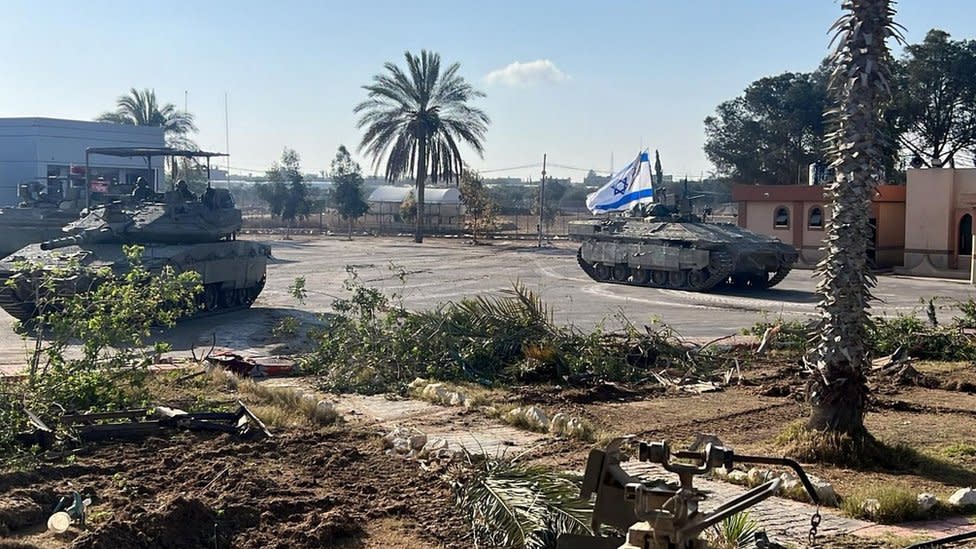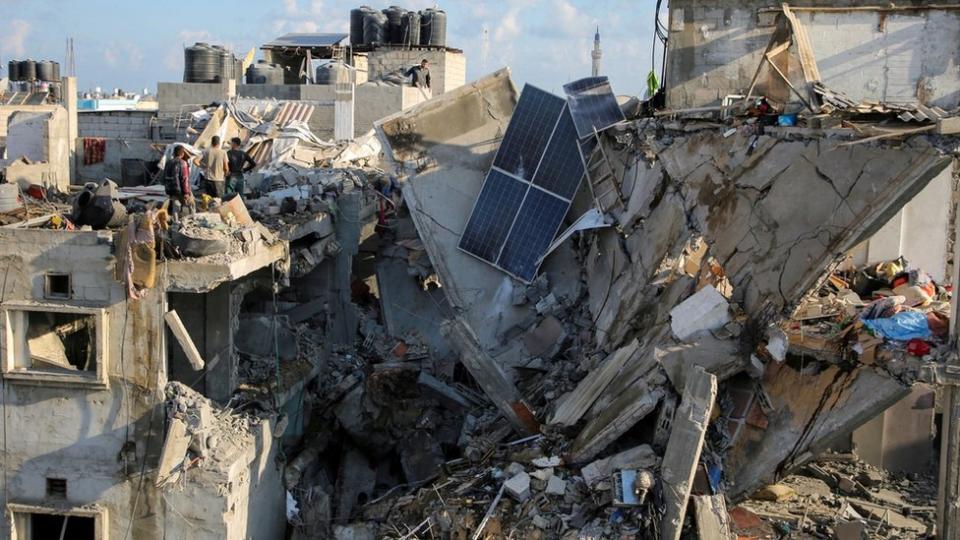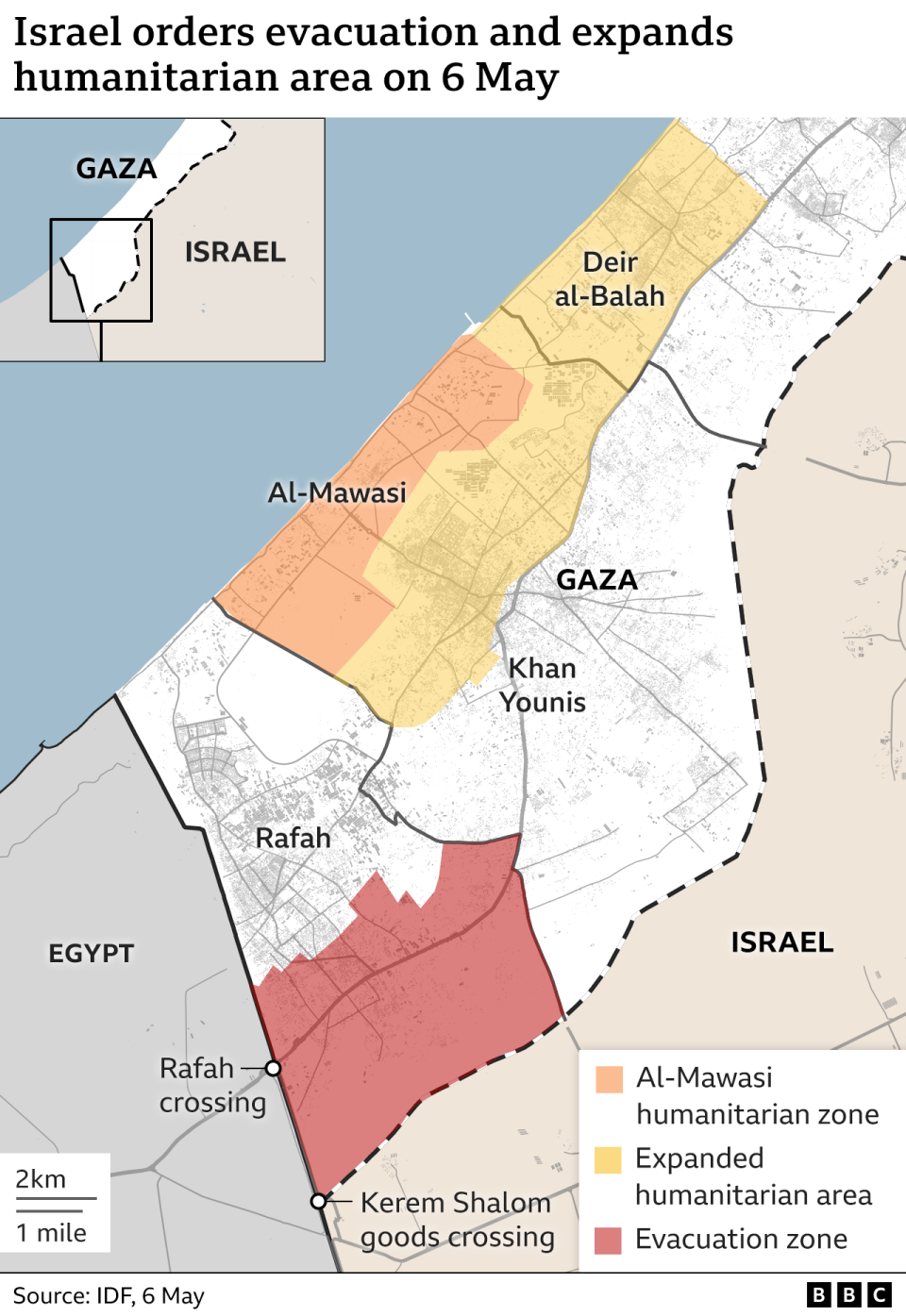Gaza: Israel takes Rafah crossing as truce talks continue

The Israeli military says its troops have taken "operational control" of the Palestinian side of the Rafah border crossing between Gaza and Egypt.
Rafah has been a key entry point for aid and the only exit for people able to flee since the start of the war between Israel and Hamas in October.
A tank brigade moved in to the crossing area after a night of intense strikes.
With Israel's Kerem Shalom crossing also closed, the UN warned Gaza's two main aid arteries were now choked off.
On Tuesday, the White House said it had been told Kerem Shalom would reopen on Wednesday.
On Monday, the Israeli military ordered tens of thousands of civilians to begin evacuating nearby eastern parts of Rafah city, ahead of what it called a "limited" operation to eliminate Hamas fighters and dismantle infrastructure.
Hamas said Israel's incursion and seizure of the Rafah crossing was aimed at undermining attempts by regional mediators to secure a new ceasefire deal.
The Palestinian armed group said on Monday that it had accepted a proposal from Egypt and Qatar, the basis of which is a weeks-long pause in the fighting and the release of several dozen hostages still held in Gaza.
Israeli Prime Minister Benjamin Netanyahu said on Tuesday that Hamas's announcement was "very far from Israel's necessary requirements" and that it was a failed attempt to "disrupt the entry of our forces into Rafah" .
He said he had instructed the mid-level Israeli delegation sent to Cairo on Tuesday to "stand firm" on the conditions required for the return of the hostages and on "vital requirements for ensuring Israel's security".
Israeli Defence Minister Yoav Gallant told troops on the Gaza border: "We will not cease operating in Rafah until Hamas is destroyed, or until the first hostage returns home."
UN Secretary General António Guterres said a deal between Israel and Hamas was "essential to stop the unbearable suffering of Palestinians in Gaza and of the hostages and their families".
"I reiterate my appeal for both parties to show the political courage and spare no effort to secure an agreement now," he added.
Israel launched a military campaign in Gaza to destroy Hamas in response to the group's cross-border attack on southern Israel on 7 October, during which about 1,200 people were killed and more than 250 others were taken hostage.
More than 34,780 people have been killed in Gaza since then, according to the territory's Hamas-run health ministry.
A deal agreed in November saw Hamas release 105 hostages in return for a week-long ceasefire and some 240 Palestinian prisoners in Israeli jails. Israel says 128 hostages are unaccounted for, 34 of whom are presumed dead.

Israel has long insisted that it must eliminate the remaining Hamas battalions in Rafah to achieve victory in the war.
But with more than a million displaced Palestinians sheltering there, the UN and Western powers have warned that a major ground offensive could have devastating humanitarian consequences.
On Monday night, flares lit up the skies over the city and witnesses said there was continuous Israeli bombardment.
Palestinian news agency Wafa cited medical sources at the local Kuwait Specialised Hospital as saying that 20 people were killed and dozens injured.
Raed al-Derby said his wife and children were killed in an strike that levelled their family home in the western Tal al-Sultan neighbourhood.
"We're patient and we will remain steadfast on this land... We are waiting for liberation and this battle will be for liberation, God willing," he told Reuters news agency.
Seven bodies were reportedly recovered from the rubble of the homes of two families in al-Jneineh.
It is one of the eastern neighbourhoods whose estimated 100,000 residents were ordered by the Israel Defense Forces (IDF) on Monday to evacuate and head towards an "expanded humanitarian area", which stretches north from al-Mawasi to the city of Khan Younis and central town of Deir al-Balah.
On Tuesday morning, an IDF statement announced that Israeli troops had begun a "precise" operation to "eliminate Hamas terrorists and dismantle Hamas terrorist infrastructure within specific areas of eastern Rafah".
Fighter jets and ground forces had also struck military structures, underground infrastructure and other sites from which Hamas operated in the Rafah area, killing approximately 20 "terrorists" and destroying three operational tunnel shafts, it added.

The IDF also announced that troops had "managed to establish operational control" of the Gazan side of the Rafah crossing, following intelligence that it was "being used for terrorist purposes".
It did not provide any details but said mortars fired from the area on Sunday had killed four Israeli soldiers and injured others at the nearby Israeli-controlled Kerem Shalom crossing.
The IDF released drone footage showing an armoured vehicle flying a large Israeli flag at the crossing as well as a number of tanks in the square outside the Palestinian migration centre.
An IDF official said the Rafah crossing was now closed and that it was working to reopen Kerem Shalom once the security situation allowed it.
Later on Tuesday, Hamas launched another four mortars were launched towards Kerem Shalom, according to the IDF.
Earlier, a spokesman for the UN humanitarian office said Israel had denied its staff access to both the Rafah and Kerem Shalom crossings.
"The two main arteries for getting aid into Gaza are currently choked off," Jens Laerke told reporters in Geneva.
He said there was only "one day of fuel available" in the UN's storage tanks and warned: "If no fuel comes in for a prolonged period of time, it would be a very effective way of putting the humanitarian operation in its grave."
There was no immediate response from the IDF. But it has said it is committed to facilitating deliveries of humanitarian aid into and within Gaza and that it has established alternative crossings, including two in the north.
Sam Rose of the UN agency for Palestinian refugees, Unrwa, which is the largest humanitarian organisation in Gaza, told the BBC from Rafah that fuel was "the basis for everything inside Gaza".
"The fuel powers the water lines, it enables our health centres to keep running, it enables the hospitals to provide life-saving care. If that fuel runs out, then everything grinds to a halt," he said.
Mr Rose also described the situation for civilians on the ground in Rafah as "absolutely terrible".
"The streets are clogged with people who are on the move. These are people from inside the evacuation zone, but also people on the outside... some of who have decided to move early," he said.
But he added that there was "nowhere safe for them to go".
"Half of the safe zone is on a sand dune, which cannot accommodate people for any length of time. The other half is inside Khan Younis, which has been subject to savage bombardment over the past several weeks."


